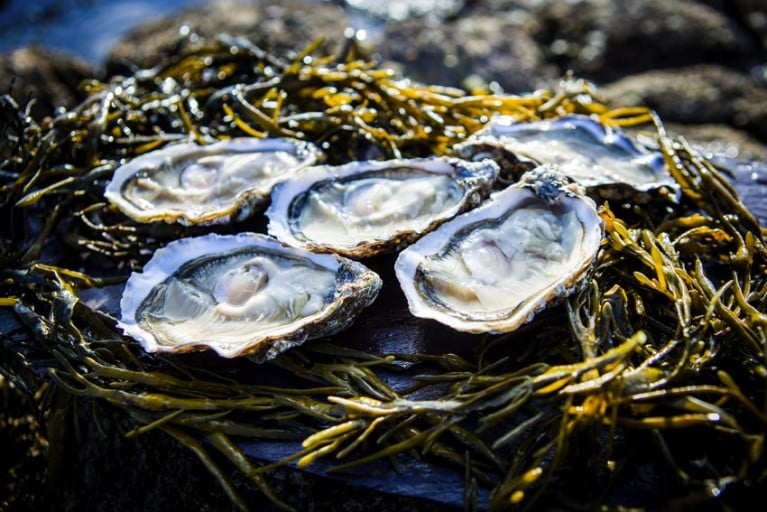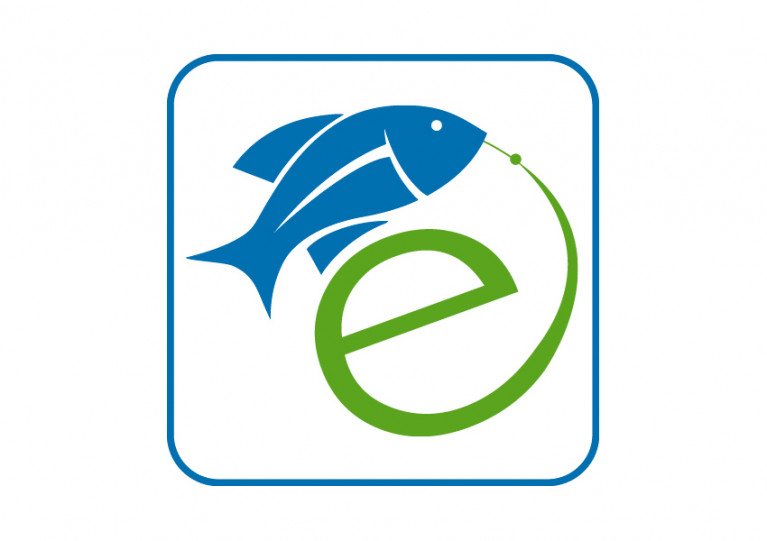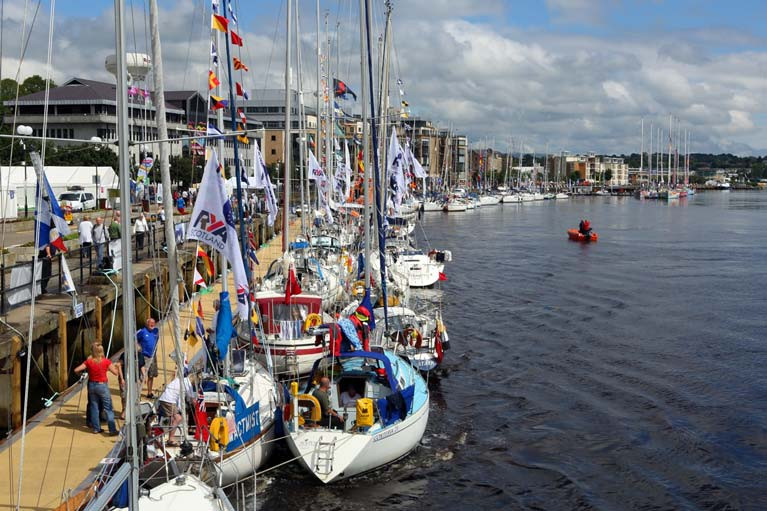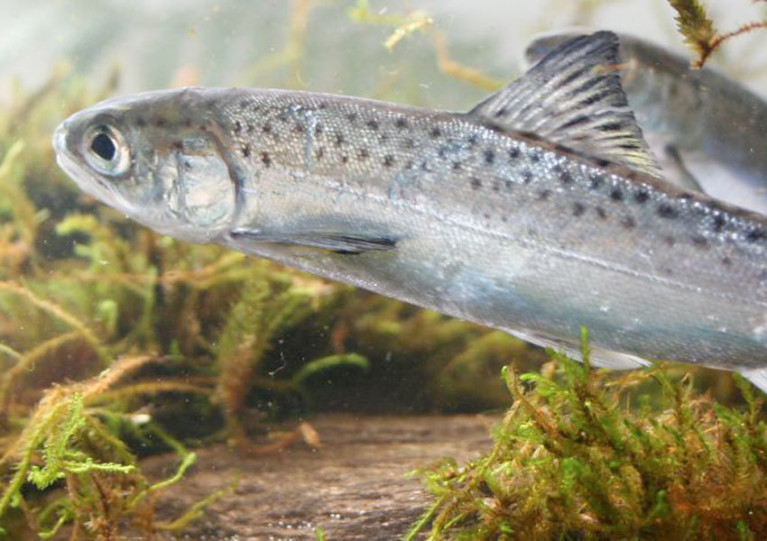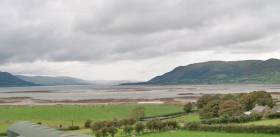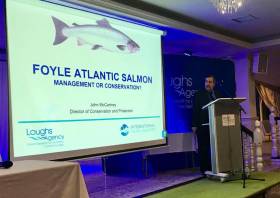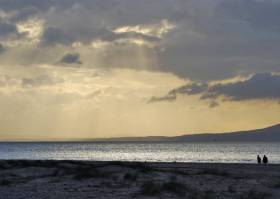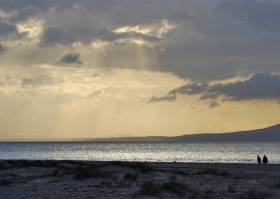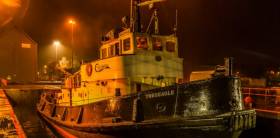Displaying items by tag: Lough foyle
Lough Foyle Oyster Fishery Licence Applications Now Open
The Loughs Agency is now inviting interested parties to apply for a licence to fish the 2020/2021 native oyster fishery in Lough Foyle.
Applicants will be required to submit a completed application form by post only (standard delivery, not recorded delivery) due to coronavirus restrictions to:
Loughs Agency Headquarters
22 Victoria Road
Derry~Londonderry
BT47 2AB
Northern Ireland
Applicants are also asked not to send additional documents or payment, only the application.
The licence fee is £150 or €166 with fees payable on receipt of licence.
Anyone who held a licence to fish the Lough Foyle native oyster fishery last season will receive an application pack via post.
If you do not receive a pack or you did not hold a licence last season but wish to apply this year, please either download a form or contact +44 (0) 28 71 342100 (lines open Mon-Fri 9am-5pm) to receive a hard copy via post.
Interested parties must have completed applications with the Loughs Agency on or before Friday 31 July. No late applications will be accepted.
Loughs Agency eLicence Portal Now Back Online
The Loughs Agency’s elicence website is now back online and anglers can purchase licences for the Foyle and Carlingford areas.
Anglers are individually responsible for compliance with their government’s advice and guidance. Anglers should keep up to date with the latest advice from the Public Health Agency (PHA) in Northern Ireland and the Health Service Executive (HSE) in Ireland.
Loughs Agency offices remain closed and the normal licence distributor network is also still under lockdown conditions. Therefore, anyone wishing to purchase a licence should do so through the elicence website.
For anglers requesting carcass tags when they purchase a licence online, these will be posted to your address. Anglers should take this into account when purchasing.
For anglers purchasing a Loughs Agency endorsement licence, please ensure you have already purchased a full season licence or concession licence from DAERA or a full season or district licence from Inland Fisheries Ireland (IFI). Loughs Agency carryout checks with our colleagues in DAERA and IFI to validate licence purchases.
If you require a Loughs Agency permit for Foyle, Finn or Greenbraes, please contact the Loughs Agency on +44 (0) 2871 342100 (Mon-Fri 9am-5pm).
Illegal fishing or pollution concerns can be reported through the Loughs Agency’s Waterwatch reporting tool online or through the 24-hour response line on +44 (0) 2871 342100.
If you require any further assistance, call the Loughs Agency at the above number during normal weekday office hours or email [email protected]
The postponement of the Clipper Race 2019 – 20 will have a huge effect on the City of Derry where the fleet was due to have its penultimate stop-over at the end of July. Derry City and Strabane District Council say the decision by Clipper Ventures to postpone the Clipper 2019-20 Race is “disappointing news but understandable” considering the current COVID-19 situation being faced across the globe.
As Afloat reported previously, crews were quarantined in the Philippines in mid-March.
The Mayor, Councillor Michaela Boyle said the decision to postpone the Race is the right one in the current climate. This postponement will have an impact on the timing of future races. As the 2019-20 edition’s remaining three legs will be resumed in approximately ten months when the circumnavigation will be completed, the next full edition of the Clipper Race will start in the summer of 2022.
And, again in light of the COVID -19 crisis, the Foyle Maritime Festival of which the Clipper event was a huge part, has also been postponed. Councillor Boyle commented “By working together and looking out for one another we can all do our bit to limit the spread of this virus and protect our local community by taking the necessary precautions to stay safe,”
The economic value of the Festival would have been expected to be substantial, with the 2018 event attracting 220,000 people and bringing in £2.20 for every pound invested by the Council. There were over 84 craft and eleven Clippers on the pontoons and quays in the heart of Derry.
NI Primary School Pupils Become ‘Salmon Ambassadors’ For Loughs Agency
Last week the Loughs Agency visited local primary schools in the Foyle and Carlingford areas as part of the Salmon Ambassadors programme.
The programme, which forms part of the legacy of 2019’s International Year of the Salmon, will see the agency working with eight schools (six in Foyle and two in the Carlingford catchmen) to connect pupils with their local river habitats, and use the lifecycle of the salmon to teach them about the broader themes of biodiversity and ecology.
Loughs Agency education officer Michael Cosgrove said: “Through the Salmon Ambassadors we hope to create an informed generation that will value salmon as they should be valued and most importantly, value the environment we share with the ‘King of the Fish’.”
In their journey to becoming a Salmon Ambassador, pupils will learn about issues effecting the Atlantic salmon from local to global level and reflect upon how modern lifestyles have an impact on local wildlife.
Through a range of activities in class and on the banks of local rivers, pupils will be encouraged to take ownership of wild places and wild things so that they can be better conserved for future generations.
Allan Bogle, community engagement officer, said: “Wach school will also look after around 100 salmonid eggs until they hatch. This a participative education programme which is really hands-on so that each pupil can connect with the salmon and their local river.”
Over the next few months, 163 pupils will undertake a range of activities as they research the migration routes, threats and life cycle of the salmon, before presenting their findings and results at a salmon conference in June.
Maritime Heritage Seminars In Foyle & Carlingford This Month
The Loughs Agency has organised two morning seminars around the theme of maritime heritage in the Foyle and Carlingford areas later this month.
The first will take place at Greencastle Golf Club next Friday 22 November from 9.30am to 12.30pm, while Carlingford Marina will host its seminar the following Friday 29 November at the same times.
Both events will include contributions from Patrick Fitzgerald, a professional historian with a long career in researching genealogy and uncovering the story of migration through the centuries, who will take attendees on a journey of migration through the Foyle and Carlingford loughs.
The Greencastle seminar will also hear from Gerald Crawford, former secretary of the Foyle Fisheries Commission, who will tell the story of commercial salmon fishing across two decades Fishing for Salmon in the Foyle.
Retired mariner Seamus Bovaird will be presenting on paddle steamers on Lough Foyle, while Edward Montgomery, secretary of The Honourable The Irish Society, will speak about the society and the Foyle fisheries, and Wes Forsythe, a career archaeologist with an interest in the Foyle area, will presenting on ;Salt and the Sea;.
In Carlingford, Brendan McSherry, Louth County Council’s heritage officer with a passionate awareness of Carlingford Lough, its shores, hinterland and communities, will present on Carlingford Lough, a barrier or a highway?
Kirstin Lemon, geologist by profession with a broader intent to inform communities about their geology and the influence on their culture, will speak about ‘Mountains, Myths and Maritime: a UNESCO Global Geopark in Mourne Gullion Strangford’.
Finally, Liam Campbell, a researcher with an intense interest in exploring the development of cultures within distinct catchments, will present on the ‘Culture of the Catchment – Source to Sea’.
Admission is free free of charge for both events, however tickets must be obtained through Eventbrite to ensure a place at the Foyle and Carlingford seminars respectively.
In other heritage news, the Department of Culture, Heritage and the Gaeltacht has published its report on the public and sectoral meetings held earlier this year on Heritage Ireland 2030, Ireland’s national heritage plan.
Among the issues raised at the sessions in Kilkenny and Galway in February were a lack of joined-up thinking across Government departments with relation to heritage issues, and a recognition of the need to understand heritage in a holistic sense encompassing everything from regional traditions to built heritage and wildlife.
Collective Work Needed To Arrest Decline Of Salmon In Foyle & Carlingford, Conference Hears
Collective work between scientists and the angling community for the survival of salmon in the cross-border catchments of Foyle and Carlingford was to the fore at the recent conference in Omagh hosted by the Loughs Agency.
Stark warnings over the decline of the species were heard along with presentations from the likes of Dr Diego Del Villar, who discussed the new SeaMonitor project that is currently studying the seas around Ireland, Northern Ireland and western Scotland, and will in time help produce a salmon management plan for the River Foyle.
The Loughs Agency says it will soon launch a public consultation to gauge the views of the public in managing the salmon fishery.
John McCartney, Loughs Agency director of conservation and protection, said: “We value the input and opinion of the public when reviewing our salmon management programme. I would encourage everyone take time to consider and respond to the questions.”
British Government Accused Of ‘Coasting’ On Post-Brexit Fisheries Plans For Northern Ireland
#Fishing - The UK Government has been accused of “coasting” on plans for Britain’s and in particular Northern Ireland’s fisheries post-Brexit, as the News Letter reports.
MPs on the Northern Ireland Affairs Select Committee have written to fisheries secretary Michael Gove for solutions to “the crushing shortage of labour, illegal oyster farming in Lough Foyle and Ireland’s continued suspension of fishing rights under the Voisinage Arrangement.”
The Voisinage Arrangement has existed since the mid 1960s and allowed for mutual access to vessels from the Republic and Northern Ireland up to six miles off the coast of each country.
But the arrangements was suspended in the Republic in 2016 after the Supreme Court ruled that it had not been properly incorporated into Irish law.
The committee have also demanded immediate “timescales” to resolve territorial claims on Lough Foyle, which have not been a practical issue since both countries have been EU member states.
The News Letter has more on the story HERE.
#Oysters - Unauthorised oysters farms have exploded in number on Lough Foyle amid a continued dispute over its ownership, as the Belfast Telegraph reports.
The estuary between the counties of Donegal and Derry remains a point of contention as Brexit looms, with both the UK and Irish governments claiming dominion over its waters.
As a result, there has been a proliferation of unregulated oyster farming that could be worth £20 million or €22.89 million each year, according to the Loughs Agency.
The Belfast Telegraph has more on this story HERE.
Dry-Docking in Donegal Boatyard of Lough Foyle Tug Veteran Completed
#boatyards – A Donegal boatbuilder, repairer and refurbishment company, Mooney Boats of Killybegs Harbour has completed works on a tug whose operator has offices based on both sides of Lough Foyle, writes Jehan Ashmore.
The tug Tregeagle operated by Foyle & Marine Dredging has its main office in Claudy, Derry and also in Moville and Letterkenny across the border in Donegal. Among the works carried out on the 15 bollard tons tug were repairs to a single shaft propeller blades, new anodes fitted and stainless steel vents on deck for diesel tanks.
In order to carry out such works, a 600 syncrolift facility which is adjacent to the Killybegs yard at Castle Point is where vessels mostly from the fishing industry are lifted out of the water for the purpose of dry-docking.
The 131 gross tonnage tug has accommodation on the main deck for the master, as for the engineer there is a single cabin and a pair of double berth cabins for the crew located elsewhere. In addition to toilets and a shower along with a galley and mess room.
On completion of the drydocking, Tregeagle departed Donegal to UK waters and is currently off the Kyle of Lochalsh, in west Scotland. The tug has also in recent years been trading in the Shetland Islands, where a recent BBC crime detective drama 'Shetland' was set in the archipelago.
Tregeagle has been in Lough Foyle since 2013 when Fowey Harbour Commissioners sold the tug to Foyle & Marine Dredging, formerly known as McCormick Transport. The fleet of this company consist of six vessels, varying from dredging craft to tugs, among them Ada Dorothy that is employed at Dublin Port.
Afloat has monitored in recent months this 8 ton bollard pull tug working in Alexandra Basin where a major redevelopment of this part of the docks is underway as part of the port’s masterplan.
Returning to Tregeagle, the veteran tug dating to 1964 was completed as Flying Demon at J. Lewis and Sons, Aberdeen as Yard No. 344 for clients Clyde Shipping Co Ltd at Glasgow. In 1978 they were restyled to Clyde Shipping Tugs Ltd.
In December 1965, as part of the Clyde Shipping towage fleet, Flying Demon assisted Cunard Line’s Queen Elizabeth. The Cunarder was then the world’s largest liner which was on the Clyde for refitting at the dry dock at Inchgreen.
During the decades of the tug's career, there have been several change of ownerships and consequently renamings. This led to operating in the North Sea out of Grangemouth and also on the English Channel from Fowey.
Tregeagle’s longest career spell has been in the Cornish port, where the tug spent over 20 years working for Fowey Harbour Commissioners. This involved assisting cargoships, cruiseships and naval vessels trhoughout the various berths along the Fowey estuary.
The veteran Tregeagle given its vintage, has a resemblance to a former Dublin Port & Docks Board (now Dublin Port Co) tug, the Coliemore (see posting) which took its name from the coastal harbour and road in Dalkey, a suburb of the capital along Dublin Bay.
Launched just two years previously to Flying Demon in 1962 was the Appelsider at Richard Dunston (Hessle) Ltd in Yorkshire, however a decade later as Coliemore the tug joined the DP&DB fleet of work vessels.
The 162 gross tonnage tug loyaly served the port until disposal in 1998, however despite been sold, the tug remained lanquished in Cork Dockyard, Rushbrooke near Cobh. The tug having remained there for over a decade was eventually scrapped at the facility in 2011.
Plans in Derry for Maritime Museum & Archive Centre at Development Stage
#MaritimeMuseum - A spokesperson for Derry City and Strabane District Council has confirmed to Afloat that plans for creation of a Maritime Museum and Archive Centre is currently at the development stage.
The project is being taken forward by Derry City and Strabane District Council in conjunction with Heritage Lottery Fund, Tourism NI and the Office of the First and Deputy First Ministers.
Once the new Maritime Museum and Archive Centre is up and running it will celebrate the city, region and Lough Foyle’s unique maritime importance over the centuries with details and exhibitions on the Foyle’s role as a vital naval base during and after the Second World War to be a pivotal feature.
Current proposals situate the museum and archive centre at the recently transformed Ebrington Square in the Waterside area of the city, in Buildings no 45, 46 and 49. The Ebrington Site was launched on 14th February 2012, features a 19th century star fort and is connected to the historic walled city by the iconic Peace Bridge.
As the city has a rich maritime heritage, there is a wealth of resources available for the planned exhibitions with an extensive archive to inspire and explore those visiting the centre. Plans for the centre include the installation of exhibition galleries, archival reading rooms, dedicated learning spaces as well as a café, shop and other visitor facilities.
Derry City and Strabane District Council is unique in Northern Ireland, in that it holds the largest and most significant public archive outside of the Public Record Office NI. Council’s Archive and Genealogy Service holds a combined resource of over 400 years of archives alongside over one million family history records.
A Reserved Matters application for the Maritime Museum was submitted to the Department of Infrastructure Ref: LA11/2016/0937/RM in November 2016. The Council is currently processing the Listed Building Consent application for the development Ref LA11/2016/1035/LBC, submitted in December 2016.
Both the applications are currently under consideration.



























